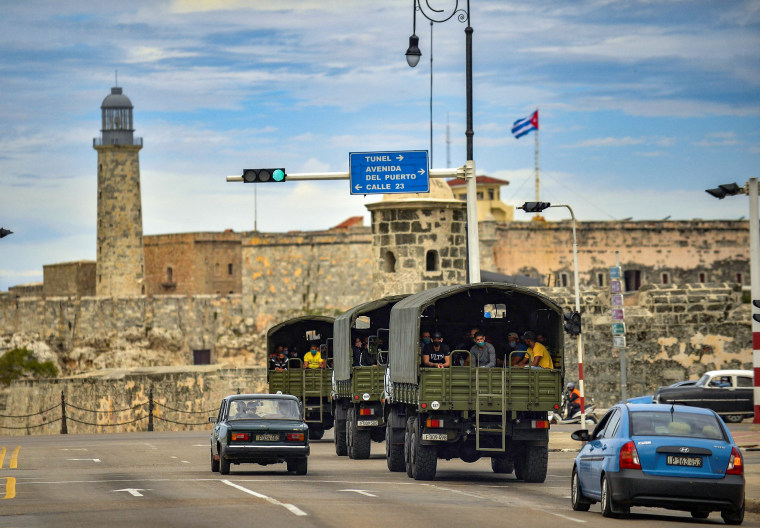The crackdown began before activists could get out onto the streets of Cuba.
For weeks, activists in Cuba had been calling for a “Civic March for Change” on Monday to demand greater freedoms from the communist-run government, a follow-up to the massive, historic protests that shook the country in July.
But a much larger-than-normal police presence was on the streets of the capital, Havana. Many of the activists who had planned the march had their homes surrounded by police and security agents, preventing them from going outside.
Despite that, some activist leaders took to social media Monday to send a message to the government.
One of the protest organizers, Saily González, called on supporters in a Facebook video to clap, telling them: "This is the applause for the Cuban people, that today is going to recommence conquering their rights, and pushing for the liberation of over 600 political prisoners, and push for an end to the violence."
Earlier, when González walked out of her house to hang white sheets she said were “for the freedom of Cuba,” a pro-government mob shouted at her, calling her a “dog” and other derogatory terms.
The leading figure of the protests, 39-year-old actor and playwright Yunior García, attempted to march alone Sunday but was prevented from leaving his apartment. On Monday, he had not made any public statements to the media. Authorities and government supporters surrounded his building Sunday as he communicated with journalists and others by holding a white rose through his window and posting a sign that read “my house is blocked" — until government supporters standing on the roof dropped a large Cuban flag to cover his window.
On Monday, videos circulated on social media showing some acts of dissent that led to confrontations with pro-government people in different parts of the island.
In one video, a small group of young Cubans dressed in white sang “We want liberty” as they danced outside a home in Santa Clara. It preceded a confrontation with government supporters who attempted to take down a sign from the home that read “Liberty.” It’s unclear if any arrests were made.
Cuban actor Edel Pérez told NBC News on Sunday that if police allowed him to leave his house, he would demonstrate Monday because of the “problems on the island” and he would do it “in solidarity with the Cuban people.”
No one really expected mass protests like the historic demonstrations that swept the island July 11. Monday’s protests were planned and gave authorities ample time to prepare for arrests or simply prevent known activists from leaving their homes. Guillermo Fariñas, an internationally known dissident, was detained days before.
Still, displays of dissent like these in Cuba are not tolerated and rarely seen. Young generations of Cubans who have little connection to the 1959 revolution are increasingly feeling more emboldened.
‘Real lives are at stake’
The recent activism in Cuba has brought out supporters in the United States and internationally. On Sunday, there was a car caravan and a rally in Miami and on Monday, Florida Gov. Ron DeSantis, a Republican, held a press conference in Miami’s iconic Freedom Tower and announced a $25 million budget to preserve the building that was a reception center for thousands of Cuban refugees in the 1960s and early 1970s.
Miami-Dade County Mayor Daniella Levine Cava tweeted a video of herself in front of the White House wearing a white shirt with a white rose attached.
Members of Congress from Florida, home of the largest Cuban American constituency, tweeted multiple times about events unfolding in Cuba while expressing support for protesters. "Real lives are at stake," Rep. Maria Elvira Salazár, R-Fla., tweeted.
"America stands with the Cuban people and their peaceful calls for freedom, democracy and an end to the repressive regime that arbitrarily detains its citizens," Rep. Debbie Wasserman Schultz, D-Fla., said.
Archipelago coordinators said there were solidarity marches organized in more than 120 cities worldwide, including marches in New York City's iconic Avenue of the Americas.
The Cuban government made it clear for weeks the protests wouldn’t happen. It rejected a permit request to march weeks ago and officials, including President Miguel Díaz-Canel, have accused the U.S. of orchestrating the protests to “destabilize” the country.
After the summer protests, García organized a group on Facebook called Archipelago that had been calling for protests Nov. 15. As the date approached and it became obvious people were nervous about taking to the streets, coordinators of the group urged Cubans to participate in other acts such as dressing in white, hanging white sheets outside their homes, or banging on pots.
The escalation in tensions comes on the same day the island reopened for tourism, after strict Covid lockdowns that at one point kept borders shut for eight consecutive months. The decimation of the tourism industry, coupled with tightened U.S. sanctions, devastated the economy and has led to chronic shortages and long lines to purchase basic foods.
Follow NBC Latino on Facebook, Twitter and Instagram.

